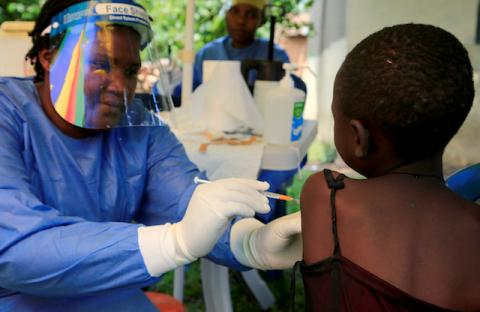Advertisement
Congo authorities say Ebola survivor falls ill a second time
GISENYI, Rwanda (Reuters) - An Ebola survivor has fallen ill with the disease for a second time in eastern Congo, the Congolese health authorities said on Sunday, saying it was not yet clear if it was a case of relapse or reinfection.
The Ebola outbreak in Democratic Republic of Congo has infected over 3,300 people and killed more than 2,200 since the middle of last year, making it the second worst year on record.
Experts say there has been a working assumption that Ebola survivors generally have immunity from the disease. There have been no documented cases of reinfection but some researchers consider it to be at least a theoretical possibility, while the recurrence of a previous infection is considered extremely rare.
In a daily report on the epidemic, the Congolese health authorities reported that a survivor in Mabalako, North Kivu province, had fallen ill with the virus again, but did not give further details.
Representatives of the World Health Organization and Congo's National Institute of Biomedical Research (INRB) said tests were being carried out to determine what had happened.
"Clinically, we will check whether it is a reinfection to know if it is the same virus and if the person has been infected by another source," Ahuka Steve Mundeke, a virologist at INRB, told Reuters.
"We have had cases where the virus persists in immune reservoirs," said Margaret Harris, a spokeswoman for the World Health Organisation (WHO). "In rare cases the virus can cause symptoms again. We are investigating now to see whether this was what happened."
A survivor working in an Ebola treatment centre fell sick again with the virus and died in July, but it has not been determined if she relapsed, was reinfected or had a false positive the first time she was ill.
Progress in containing the disease has been hampered in the last month by a surge in violence that forced aid groups to suspend operations and withdraw staff from the epidemic's last hotspots.
Medecins Sans Frontieres (Doctors Without Borders) said they pulled their staff out of Biakoto region in Ituri province on Dec. 4 following two fresh attacks on their health centres by groups of people armed with sticks and machetes.
"MSF cannot work if the security of our staff and patients is not ensured," the aid group said in a statement.
Mai Mai militia fighters and local residents have attacked health facilities on several occasions since the outbreak began, sometimes because they believe Ebola does not exist, in other cases because of resentment that they have not benefited from the influx of donor funding.
(Writing by Hereward Holland; Editing by Edmund Blair)



















Add new comment